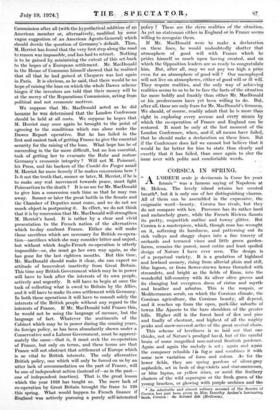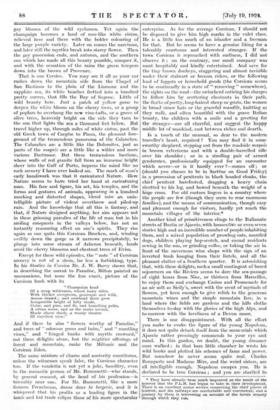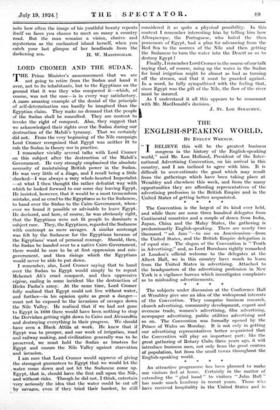CORSICA IN SPRING. .• "A L'ODEUR seule je devinerais la
Corse les yell fermes " was: a famous saying of Napoleon at St. Helena. The lovely island retains her scented breath*, but it is only 'one of her distinguishing charms. All of them can be assembled in the expresSive, the enigmatic word—beauty. COrsica has rivals, but they do not compare with her.' Provence has its rather- hard and melancholy grace, while the French' Riviera flaunts its pretty, coquettish outline and towny glitter. But Corsica is a masterpiece, which, though man has wrought on it, softening its harshness, and patterning out its rich valleys and shaggy slopes into a fine tracery of orchards and terraced vines and little green garden- farms, remains the purest, most entire and least spoiled design of Nature I have ever seen. The design is of a perpetual variety. It is a gradation of highland and lowland scenery, rising from alluvial plain and still, blue lagoon, or from flower-strewn lawns threaded with streamlets, and bright as the fields of Enna, into the wonderful hill-country with its silver olive groves and its changing but evergreen dress of cistus and myrtle and heather and arbutus. This is the maquis, or Mediterranean scrub, on which the Corsican climate, the Corsican agriculture, the Corsican beauty, all depend, and it reaches up from the open, park-like suburbs of towns like Ajaccio to the bare shoulders of the greater hills. Higher still is the forest land of ilex and pine and finally of chestnut, and highest of all' the mighty peaks and snow-covered aretes of the great central chain.
This scheme of loveliness is so laid out that one thinks, not of Nature's prodigal har.d, but of the careful brain of some magnified non-natural Scottish gardener. Again- _and again the melody is set ; again and again the composer rebuilds I is fugue and combines it with some new variation of form and colour. As for the lower fields, they are spring gardens of silver-grey asphodels, set in beds of dog-violets and star-anemones, or blue lupins, or yellow irises, or amid the feathery clusteis of the wild asparagus or the fresh green of the young bracken, or glowing with purple orchises and the * An admirable and almost solitary account of the flowers of Corsica has just been given in Miss Dorothy Archer's fascinating book, Corsica the Scents! isle (Methuen)., gay blooms of the wild cyclamen. Yet again the Champaign becomes a land of rose-like white cistus, relieved here and there with the bolder colouring of the large purple variety. Later on comes the narcissus, and later still the myrtles break into starry flower. Then the gay procession ends, and autumn, and the southern sun which has made all this beauty possible, conquer it, and with the cessation of the rains the green tempers down into the brown of Provence.
That is one Corsica. You may see it all as your car rushes down the mountain side from the Chapel of San Bastian to the plain of the Liamone and the sapphire sea, its white beaches fretted into a hundred' pretty curves, that fills the Bay of Sagone. Little of wild beauty here. Just a patch of yellow gorse to deepen the white bloom on the cherry trees, or a group of poplars to overhang the new vine-tufts, or a grove of olive trees, heavenly bright on the side they turn to the sun that lights the sea a thousand feet below. But travel higher up, through miles of white cistus; past the ' old Greek town of Cargese to' Piana, the pleasant fore- ground of the tremendous panorama of the Calanches. The Calanches are a little like the Dolomites, just as parts of the' maquis are a little like a wilder and more various Dartmoor. But these tremendous bastions, whose walls of red granite fall' from an inunense" height sheer into the Gulf of Porto; impress the mind like no rock scenery I have ever looked on. The mark of man's early handiwork was that it caricatured Nature. 'Here Nature seems . to have tried her hand at caricaturing man. His face and figure, his art, his temples, and the forms and gestures of animals, appearing in a• hundred mocking and distorted shapes, blend into an unin- telligible picture of violent overthrow and piled-up ruin. And the knowledge that all this is fantasy, and that, if Nature designed anything,. her aim appears not in these grinning parodies of the life of man but in his smiling conquests in the valleys below, has not an instantly reassuring effect on one's spirits. They rise again as one quits this Corsican Bracken, and, winding swiftly down the gorge as it narrows precipitately, to plunge into some stream of Acheron beneath, lands amid the cherry blossoms and chestnut trees of Evisa.
Except for these wild episodes, the " note " of Corsican scenery is not of a stern, far less a forbidding, type. In his Studies in.. Corsica Mr. J. W. Barry shows that, in describing the ascent to Paradise, Milton painted an unconscious, but none the less exact, picture of the Corsican bush with its
" Champaign head Of a steep wilderness, whose hairy sides, With thicket 'overgrown, grotesque and wild, Access denied ; and overhead there grew Insuperable height of lofty shade, Cedar, and pine, and fir, and branching palm, A silvan scene, and as the ranks ascend, Shade above shade, a woody theatre Of stateliest view."
. And if there be also " flowers worthy of Paradise," and trees of " odorous gums and balm," and " mantling vines,"., and " fringed banks with myrtle crowned," not ,these delights alone, but the mightier offerings of forest and mountain, make the Miltonic and the Corsican Eden.
The same mixture of charm and austerity constitutes, unless the witnesses speak false, the Corsican character too. If the vendetta is not yet a joke, banditry, even in the romantic person of Mr. Romanetti—who stands, by general consent, at the head of his profession—is tolerably near one. For Mr. Romanetti, like a more famous Frenchman, donne dans La' bergerie, and it is whispered that his profits as a leading figure in the lamb and kid trade eclipse those of his more spectacular enterprise. As for the average' Corsican, I should mit be disposed to give him high marks. in the valet class. He, is a little too much of an islander and a freeman for that. But he seems to have a genuine liking for a tolerably courteous and interested stranger. If the town Corsican is reproached with surliness, I did not observe it ; on the contrary, our small company was most hospitably 'and kindly entertained. And save for the tiny brown donkeys, staggering and almost invisible under their stalwart or buxom riders, or the following load of faggots or household goods (the Corsican' seems to be continually in a state of" removing " somewhere), the sights on the road—the swineherd enticing his charges to follow him by scattering chestnuts in their path, the flocks of pretty, long-haired-sheep or-gnats, the women in' broad 'straw hats or the graceful mandile, knitting as they walk, and often beautiful with the grave Italian beauty, the children with a smile and a greeting for the stranger—are all cheerful, and suggest the happy middle lot of Mankind, cast between riches and dearth.
Is -a touch of the unusual, so dear to the modern traveller's heart, required ? You may find it in some 'swarthy shepherd, stepping out from the roadside maquis in brown velveteens and with a double-barrelled rifle over his shoulder ; or in a strolling pair of armed gendarmes, professionally equipped for an encounter which never—or is it' hardly ever ?—comes off ; or (should you chance to be 'in Sartene on Good Friday) in a-procession of penitents in black hooded-cloaks, -the chief penitent barefooted, dragging a heavy chain rivetted- to- his 'leg, and bowed' beneath the weight of a hive cross. For old custom lirgers in a country 'where the people are few (though they seem to 'rear enormous families),and the 'means of communication, though easy and pleasant enough for visitors, hardly yet reach the mountain villages of the interior.* Another kind of primitiveness clings to the Italianate streets of Bastia or Ajaecio, with houses five or even seven stories high and an incredible number of people inhabiting them, and a mixed population of prowling cats, muzzled dogs, children playing hop-scotch, and casual residents sewing in the sun, or grinding coffee, or taking the air in front of the cavernous wine shops with' the sign of an inverted bush hanging from their lintels, and all the pleasant clatter of a Southern quarter. It is astonishing that, with these delights, such a small contingent of bored sojourners on the Riviera seems to dare the sea-passage of eight hours from Nice, or thirteen from Marseilles, to enjoy them and exchange Casino and Promenade for an air soft as Sicily's, sweet with the scent of myriads of flowers, yet keen enough to give relish to the generous mountain wines and the simple mountain fare, in a land where the fields are gardens and the hills clothe themselves to-day with the glories of the high Alps, and to-morrow with the loveliness of a Devon moor.
There is one disappointment. With all the effort you make to evoke the figure of the young Napoleon, it does not quite detach itself from the mem orials which Ajaecio rather pressingly commends to your eye and mind. In this garden, no doubt, the young dreamer once walked ; in that bare little chamber he wrote his wild books and plotted his schemes of fame and power. But somehow he never seems quite . real. • Charles Bonaparte and Madame Mere, and the weird sisters, are all intelligible enough. Napoleon escapes you. He is declared to be true Corsican ; and you are startled to
* They have 'already' been much improved as-the result of the interest that the P.L.M. has begun to take in their development. There is an excellent motor service connecting the chief places of intefest, and the raildrays are comfortable and convenient, and 'a journey .by them is interesting on account of the lovely scenery through which they run.
note how often the image of his youthful beauty repeats itself on faces you chance to meet on many a country road. But the man remains a vision, elusive and mysterious as the enchanted island herself, when you catch your last glimpse of her headlands from the








































 Previous page
Previous page